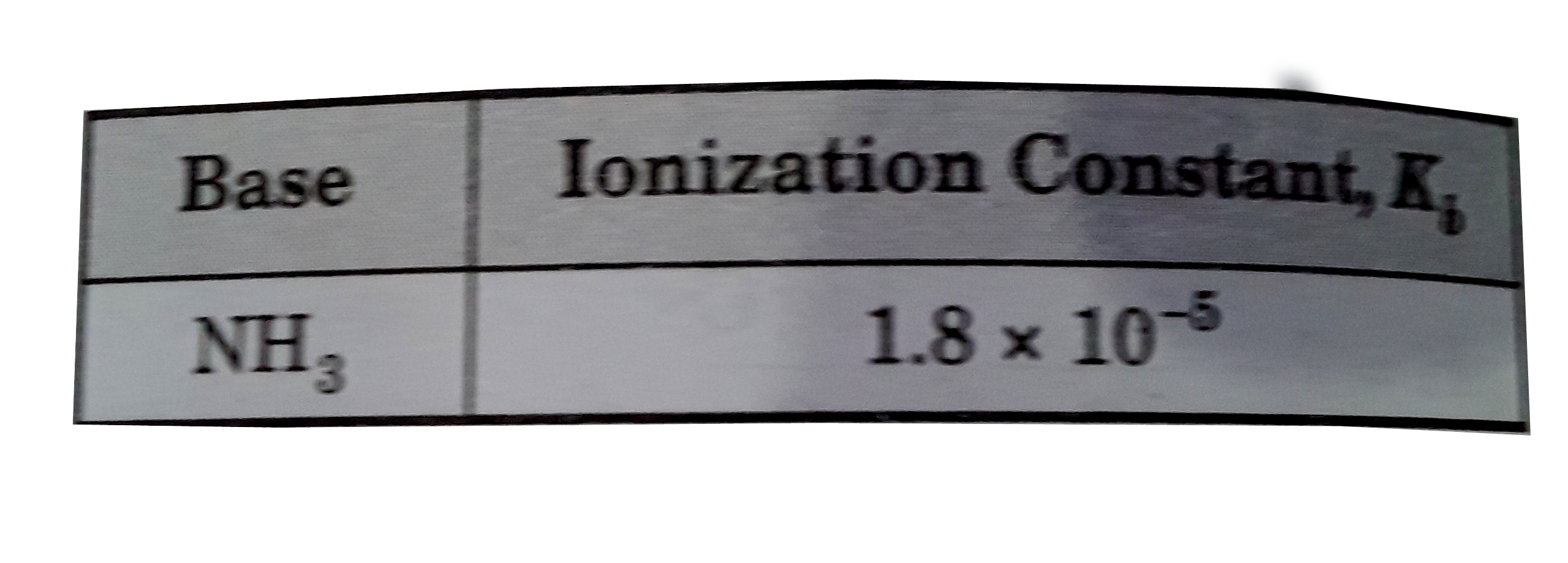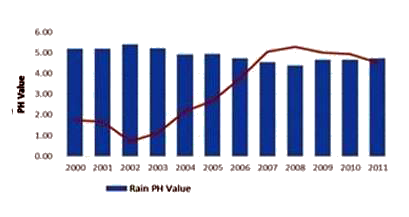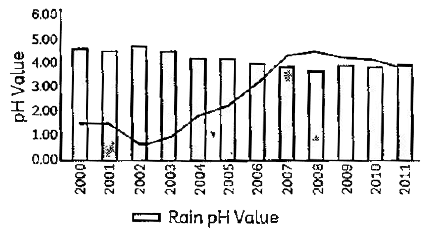The pH of a sample of vinegar is 3.76, Calculate the concentration of hydrogen ion in it.
To calculate the concentration of hydrogen ions ((H+)) in a sample of vinegar with a pH of 3.76, we can follow these steps:
Step 1: Understand the relationship between pH and hydrogen ion concentration
The pH of a solution is defined as the negative logarithm (base 10) of the hydrogen ion concentration:
pH=−log(H+)
Step 2: Rearrange the formula to find (H+)
To find the concentration of hydrogen ions, we can rearrange the formula:
(H+)=10−pH
Step 3: Substitute the given pH value into the equation
Now, we will substitute the given pH value of 3.76 into the equation:
(H+)=10−3.76
Step 4: Calculate 10−3.76
To calculate 10−3.76, we can break it down:
(H+)=10−4×100.24
Step 5: Calculate 100.24
Using a calculator or logarithm table, we find:
100.24≈1.737
Step 6: Combine the results
Now, we can combine the results:
(H+)=10−4×1.737=1.737×10−4mol/L
Final Answer
The concentration of hydrogen ions in the sample of vinegar is:
(H+)≈1.737×10−4mol/L
---
The pH of a solution is defined as the negative logarithm (base 10) of the hydrogen ion concentration:
pH=−log(H+)
To find the concentration of hydrogen ions, we can rearrange the formula:
(H+)=10−pH
Now, we will substitute the given pH value of 3.76 into the equation:
(H+)=10−3.76
To calculate 10−3.76, we can break it down:
(H+)=10−4×100.24
Using a calculator or logarithm table, we find:
100.24≈1.737
Now, we can combine the results:
(H+)=10−4×1.737=1.737×10−4mol/L
The concentration of hydrogen ions in the sample of vinegar is:
(H+)≈1.737×10−4mol/L
Topper's Solved these Questions
- NCERT BASED EXERCISEBOOK - CENGAGE CHEMISTRYCHAPTER - NCERT BASED EXERCISEEXERCISE - Thermodynamics
50 Videos
- ISOMERISMBOOK - CENGAGE CHEMISTRYCHAPTER - ISOMERISMEXERCISE - Assertion-Reasoning Type
1 Video
- ORGANIC REACTION MECHANISMBOOK - CENGAGE CHEMISTRYCHAPTER - ORGANIC REACTION MECHANISMEXERCISE - Analytical and Descriptive
6 Videos
Similar Questions
A cell contains two hydrogen electrodes. The negative electrode is in contact with a solution of 10−6 M hydrogen ions. The emf of the cell is 0.118 V at 25∘C calculate the concentration of hydrogen ions at the positive electrode.
View SolutionA cell contains two hydrogen electrode. The negative electrode is in contact with a solution of 10−6 M hydrogen ions. The emf of the cell is 0.118 V at 25∘. Calculate the concentration of hydrogen ions at the positive electrode.
View Solution
Knowledge Check
The concentration of hydrogen ion in water is
A8B1×10−7C7D43472Calculate the concentration of hydrogen ion in mol/L of a 0.010 M solution of NH4Cl
 A4.2×10−4B2.4×10−6C1.8×10−7D5.6×10−12
A4.2×10−4B2.4×10−6C1.8×10−7D5.6×10−12The pH value of a solution is 3. What is the concentration of hydrogen ion present in solution?
A10−3 mol/LB10−6mol/LC103mol/LD10−9mol/L
A cell contains two hydrogen electrodes. The negative electrode is in contact with a solution of 10−6M hydrogen ions. The EMF of the cell is 0.118V at 25∘C. Calculate the concentration of hydrogen ions at the positive electrode.
View SolutionA cell contains two hydrogen electrodes. The negative electrode is in contact with a solution of 10−6M hydrogen ions. The emf of the cell is 0.118V at 25∘C. Calculate the concentration of hydrogen ions at the positive electrode.
View SolutionIn which year is concentration of hydrogen ion the highest?

View SolutionIn which year is concentration of hydrogen ion the highest?

View SolutionA cerain sample of beer has a pH of 10. The concentration of hydrogen ion in the beer is
View Solution
